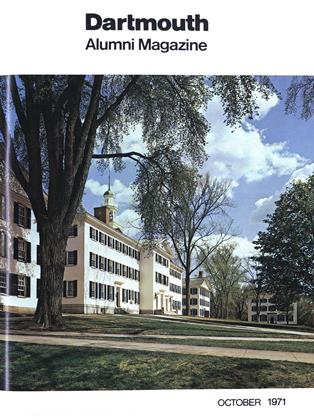DavidLoye '48. New York: W. W. Norton &Company, Inc., 1971. 381 pp. $8.95.
The American Dilemma of which Gunnar Myrdal wrote so cogently a generation ago is with us still. Much has changed, many things have improved, but we remain at bottom a racist nation. David Loye pursues in the context of the 1970's the Myrdal theme, combining history and psychology to arrive at an ingenious—if naive—solution of America's race problem. He explores the "black and white sickness" with sympathy, literary skill, and insight against a background of black history, to which he applies in a parallel narrative the findings of modern psychology. The two elements of the book are smoothly interwoven, yet each is developed in sufficient depth to carry conviction.
Where Mr. Loye himself stands is never for a moment in doubt. He believes passionately in the real equality of men, and he is an activist. From his account of America's black past the towering figures who emerge are Frederick Douglass, W. E. B. Du Bois, and Malcolm X. In psychology he identifies the great creative minds as those of Freud, Pavlov, and Lewin. It is with Kurt Lewin that he brings the two avenues of his treatment together, applying the problem-solving techniques derived from group dynamics to the centuries-old racial conflict. Lewin's experiments showed that men's attitudes can be changed, even toward so sensitive an issue as race; they showed also that one of the most effective instruments of change is participation in the decision-making process.
Such is the basis, much oversimplified, on which Mr. Loye proposes to solve our racial problem. Borrowing from the concept of the nationwide election, he would have each of us simultaneously take part in a small scale discussion of race relations. Out of these hundreds of thousands of confrontations, computers would derive a consensus so broadly based as to be of itself authority for drastic reform. But suppose there is no consensus upon which north and south, city and country, rich and poor, can agree? The possibility that consensus might uphold the status quo, or even turn back the clock, involves risks too great for any public official to accept.
None of which is to say that David Loye' has not written a provocative, valuable, potentially influential book. He has. Even historians and psychologists, already surfeited with the facts, may find new perspectives and fresh insights, while the lay reader can hardly fail to encounter a whole new world of challenge and of hope. Mr. Loye's prescription for the healing of a nation, if it does nothing else, reminds us forcefully that the nation is ill.
Editor of The Papers of Daniel Webster,Mr. Wiltse, as Professor of History, Dartmouth College, teaches a seminar "TheCompromise of 1850." He is the author ofthe three-volume biography of John Calhoun, The Jefferson Tradition in American Democracy, and The New Nation, 1800-1845.
 View Full Issue
View Full Issue
More From This Issue
-
 Feature
FeatureThayer School's Centennial
October 1971 By WILLIAM P. KIMBALL '28 -
 Feature
FeatureOMBUDSMAN
October 1971 By MARY ROSS -
 Feature
FeatureDartmouth Art Show in Boston
October 1971 -
 Feature
FeatureSummer '71: Diligent Diversity
October 1971 -
 Article
ArticleFaculty
October 1971 By ROBERT B. GRAHAM '40 -
 Article
ArticleBig Green Teams
October 1971
CHARLES M. WILTSE
-
 Books
BooksJOSHUA R. GIDDINGS AND THE TACTICS OF RADICAL POLITICS.
OCTOBER 1970 By Charles M. Wiltse -
 Books
BooksTHE PAPERS OF ADLAI E. STEVENSON: WASHINGTON TO SPRINGFIELD. 1941- 1948.
APRIL 1973 By CHARLES M. WILTSE -
 Article
ArticleWebster and a Small College
April 1974 By CHARLES M. WILTSE -
 Feature
FeatureImpeachment !
May 1974 By CHARLES M. WILTSE -
 Books
BooksA Strong and Hungry Spirit
June 1975 By CHARLES M. WILTSE -
 Books
BooksRecord Completed
March 1980 By Charles M. Wiltse
Books
-
 Books
BooksFaculty Notes
February 1947 -
 Books
BooksMOSTLY MAMA.
JUNE 1972 By EDWARD M. POTOKER '53 -
 Books
BooksPEPPERFOOT OF THURSDAY MARKET
June 1941 By Herbert F. West '22 -
 Books
BooksTHE LAST TIME I SAW THEM,
August 1946 By Herbert F. West '22 -
 Books
BooksTHE UNITED STATES MARINE CORPS.
NOVEMBER 1967 By MAJOR ERIC H. WIELER, USMC -
 Books
BooksBLACKS IN THE INDUSTRIAL WORLD: ISSUES FOR THE MANAGER.
February 1975 By ROBERT MUNRO MACDONALD

